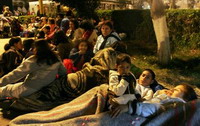Earthquake in Peru brings sorrow and works miracle
The towering colonial-era adobe church housed more than 300 relatives and friends who wanted to pay tribute to the family patriarch, a popular man who managed a fleet of minibuses in this dusty port city and succumbed to a heart attack at age 67.

Just as the Mass was ending, the earth began to heave and the church collapsed. Two minutes later, hundreds of friends and distant relatives were dead or dying in a giant pile of rubble. Miraculously, Alejandro Espino's family - all three generations of it - survived unscathed.
"It was a miracle of God," said Espino's widow, Dora.
The Mass began at dusk Wednesday, paying tribute to Espino, who died in mid-July. The Espino family filled the first two rows of simple wooden pews, with friends and family behind them.
"All the seats were filled," said Vilma, one of Espino's seven children. "My father was very dear, very respected."
As the Rev. Jose Emilio Torres finished the service, a magnitude-8 earthquake struck, leveling 85 percent of this city of 90,000 people and killing at least 540 people.
"The movement was up-and-down, up-and-down. The earth jumped. Then it changed direction," swaying laterally, said the Rev. Alfonso Berrade, 67, who was in the priests' residence across a courtyard. "I thought I was dead."
Screaming and begging for mercy, people ran for the exits or clung to columns flanking the pews. Espino's family stayed put.
"We didn't run. We just hugged each other," said Vilma Espino, 38. "We hugged one another while everything fell all around."
First the roof. Then the walls - all four stories worth. Everything fell inward.
"I thought we were done for," Torres said in a Lima hospital, where he is recuperating from a broken elbow.
Dozens of people were killed instantly. Some were half-buried, their heads and torsos sticking out of piles of crumbled adobe, chunks of ceiling and splintered wooden beams.
But Alejandro Espino's family was unhurt: all of his children, his grandchildren, his sons-in-law. Torres also stood, incredulous, choking in dust with the altar boys, the cantor, the sacristan and the lone musician, a guitarist.
The atrium above them was intact. Its four reinforced concrete columns had held as other pillars disintegrated into sand and grit. Also standing was San Clemente's facade, which flanks the central square of this city of anchovy fishermen.
"I turned my face to the left and I realized there was no roof because I saw the stars," Torres said.
The Espinos went to work saving whom they could. Vilma's husband pulled out about 40 people, she said.
They worked all night but couldn't reach many of the buried, whose groans and ever-fainter pleas for help could still be heard when the first official rescue teams arrived the following morning, family members said.
"There was no light. There were no flashlights. There were no saws to cut the beams," said Vilma's sister Carmen, 35.
Some of the trapped made desperate calls on cell phones from beneath the rubble. Some of them were saved. Others died of internal injuries and asphyxiation. No one knows quite how many - though authorities said Sunday that 135 bodies had been pulled from San Clemente so far.
Townspeople found a nephew of Alejandro Espino hugging his 7-month-old son, Vilma said.
"'Take my son. Take my son,' he told them. 'Then come for me,"' she said. But when they returned, they couldn't find the man, who died with his wife and three daughters. Only the baby survived.
Vilma and Carmen said they had confirmed the deaths of at least 50 members of Espino's extended family. Vilma said the dead include "adults, elderly people, youths. There are cousins, uncles and aunts, nieces and nephews, cousins of my father. The majority cousins of my father."
Officials have yet to compile a list of the dead. Many have already been buried in graves marked with simple wooden crosses because cemeteries are overwhelmed and there is no way to refrigerate bodies.
Fighting back tears, Vilma said the family has been numbed by the overwhelming grief.
"Our bodies have only just begun to hurt," she said. "We just realized we're bruised."
Dora Espino, speaking with her daughters in the living room of their modest home, said she was grateful amid the loss of so many people so dear to be surrounded by a family intact. She suggested her husband had a hand in their survival.
"I was asking my husband," she said: "`Help me with our children. Help me."'
Subscribe to Pravda.Ru Telegram channel, Facebook, RSS!




